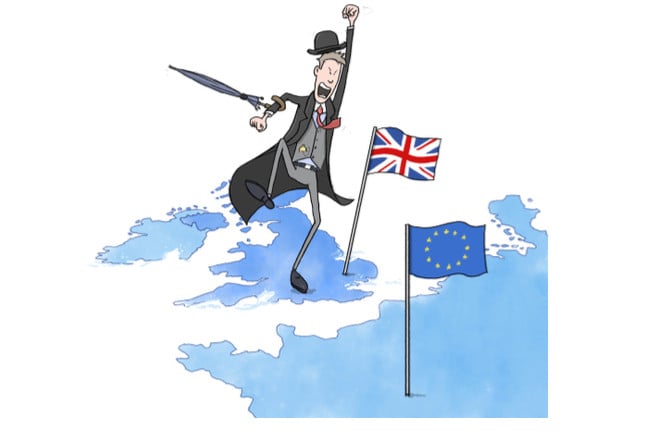
With the UK launching its guidance for governing AI development and deployment last week, legal experts are warning that most organizations will look to the proposed EU AI Act as a means of complying with both regimes.
The AI Act, which proposes a tiered approach to bans, restrictions, and safeguards in the introduction of AI, got backing on February 13 from two key groups of lawmakers at the European Parliament. Members in both committees for justice and the single market ratified a provisional agreement launched late last year.
In an effort to diverge from the EU following its departure from the world’s largest political and trading bloc, the UK has launched “guidance” in dealing with challenges of introducing AI that will use existing laws together with a renewed focus from regulators, in what it calls a light-touch or “pro-innovation” approach based on outcomes.
“To deliver this outcomes-based approach, existing regulators will be responsible for interpreting and implementing the regulatory principles in their respective sectors and establishing clear guidelines on how to achieve these outcomes within a particular sector,” the guidance states [PDF].
However, since much of the activity of any AI development and deployment in the UK is likely to fall within the reach of the EU law, businesses will focus on complying with the rules from Brussels with the reasonable view that they would also fall within London’s guidance at the same time.
Speaking to The Register, Linklaters technology lawyer Peter Church said the EU’s AI Act has an “enormously broad scope.”
“If you’ve got users in the EU, you’re caught; if the output from your AI system is used in the EU, you’re caught; if you put it on the market in the EU, you’re caught. It would be quite difficult for most UK companies to conclude that they are not going to become subject to the EU AI Act,” he said.
“It’s quite likely that the process that they would follow to bring them to compliance under the EU AI Act would probably be sufficient to satisfy the requirements in the UK, and most other jurisdictions,” the AI law expert told us.
Fear that the AI Act would be draconian may be unjustified, Church added. “What the commission has done through the AI Act is actually taking more of a deregulatory [approach] because what you don’t want is different member states all independently generating their own AI laws.”
The UK might have very good reasons to hold back from regulating AI as it is a fast-changing technology. The development of the EU law faced amendments last year as it struggled to accommodate the development of generative AI, very much the darling of media and investors alike.
Pinsent Masons technology lawyer Sarah Cameron told The Register that the AI Act’s significant extraterritorial scope would mean any UK providers who develop AI systems to put into service in the EU would be in scope, as would they would where output is used in the EU.
“It will also apply to importers and distributors placing AI systems in the EU market and manufacturers putting systems or products with AI systems on the EU market under their own name,” she said.
“If businesses in UK prioritized compliance with EU AI Act, they should fall within the UK’s AI strategy despite the primarily horizontal vs vertical approach respectively.
“They need to keep abreast of any sector specific regulation and guidance that may be released, particularly if this is put on a statutory footing, and should also watch that any targeted UK general purpose AI regulation that may follow aligns with the EU.”
In the US, California has started to propose legislation governing AI, covering the backyard of many big tech companies and a hotbed of AI startups. The federal government is yet to propose legislation.
Last year, the UK hosted an AI Safety Summit in its big pitch for relevance in this burgeoning tech landscape. But with US and EU legislators now encroaching on the territory, the island nation may struggle to get its voice heard. ®
- SEO Powered Content & PR Distribution. Get Amplified Today.
- PlatoData.Network Vertical Generative Ai. Empower Yourself. Access Here.
- PlatoAiStream. Web3 Intelligence. Knowledge Amplified. Access Here.
- PlatoESG. Carbon, CleanTech, Energy, Environment, Solar, Waste Management. Access Here.
- PlatoHealth. Biotech and Clinical Trials Intelligence. Access Here.
- Source: https://go.theregister.com/feed/www.theregister.com/2024/02/19/uk_ai_compliance_eu/
- :has
- :is
- :not
- :where
- 7
- a
- accommodate
- Achieve
- Act
- activity
- actually
- added
- Agreement
- AI
- AI Act
- AI strategy
- AI systems
- Aligns
- alike
- All
- also
- amendments
- an
- and
- any
- Apply
- approach
- ARE
- AS
- At
- back
- backing
- Bans
- based
- BE
- because
- become
- Big
- big tech
- both
- bring
- broad
- Brussels
- burgeoning
- businesses
- but
- Calls
- cameron
- caught
- challenges
- church
- clear
- CO
- commission
- committees
- Companies
- compliance
- conclude
- covering
- darling
- dealing
- deliver
- departure
- deployment
- Despite
- develop
- Development
- different
- difficult
- distributors
- Diverge
- don
- done
- effort
- enormously
- establishing
- EU
- European
- European Parliament
- existing
- expert
- experts
- faced
- Fall
- February
- Federal
- Federal government
- Focus
- follow
- following
- For
- from
- General
- generating
- generative
- Generative AI
- get
- going
- good
- got
- governing
- Government
- Group’s
- guidance
- guidelines
- Have
- he
- heard
- hold
- Horizontal
- hosted
- How
- How To
- HTTPS
- if
- implementing
- in
- independently
- interpreting
- into
- introducing
- Introduction
- Investors
- island
- IT
- ITS
- jpg
- jurisdictions
- Justice
- Keep
- Key
- landscape
- largest
- Last
- Last Year
- launched
- launching
- Law
- lawmakers
- Laws
- lawyer
- Legal
- legal experts
- Legislation
- legislators
- likely
- London
- Look
- Manufacturers
- many
- Market
- May..
- mean
- means
- Media
- member
- Members
- might
- more
- most
- much
- name
- nation
- Need
- now
- of
- on
- or
- organizations
- Other
- outcomes
- output
- own
- parliament
- particular
- particularly
- Peter
- Pitch
- placing
- plato
- Plato Data Intelligence
- PlatoData
- political
- primarily
- principles
- prioritized
- probably
- process
- Products
- propose
- proposed
- proposes
- providers
- provisional
- Publishing
- purpose
- put
- Putting
- quite
- RE
- reach
- reasonable
- reasons
- regimes
- regulating
- Regulation
- Regulators
- regulatory
- released
- relevance
- renewed
- Requirements
- respective
- respectively
- responsible
- restrictions
- Reuters
- rules
- s
- safeguards
- Safety
- Said
- same
- satisfy
- scope
- sector
- Sectors
- service
- she
- should
- significant
- since
- single
- specific
- started
- Startups
- States
- Strategy
- Struggle
- subject
- sufficient
- system
- Systems
- taking
- targeted
- tech
- tech companies
- Technology
- territory
- that
- The
- the UK
- the world
- their
- Them
- These
- they
- this
- Through
- time
- to
- together
- told
- Trading
- two
- Uk
- under
- us
- use
- used
- users
- Ve
- vertical
- very
- View
- Voice
- vs
- want
- warning
- Watch
- week
- What
- which
- WHO
- will
- with
- within
- world
- would
- year
- yet
- You
- Your
- zephyrnet













